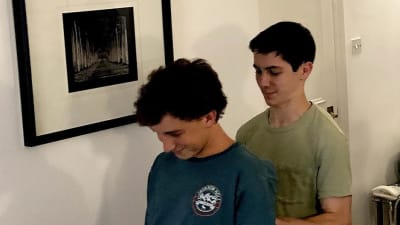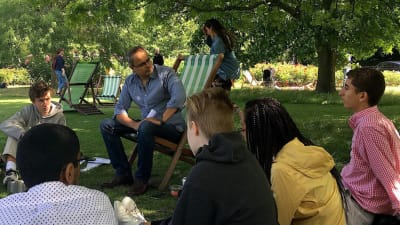SEGL in London begins!
The SEGL Summer Institute in London is officially underway, and the days are just packed!
Students arrived to our residential townhouses last Sunday and jumped right into their first leadership challenge of the summer: to select (as a group, without any faculty guidance) one London site, out of three, to explore. After deciding on Rembrandt Gardens, a local tulip-filled park established in 1975 to commemorate the founding of the city of Amsterdam, students had their first (supervised!) opportunity to explore their neighborhood.
Upon our return, we shared our first meal together and introduced SEGL and each other. Then it was finally time for bed and an opportunity to banish jet lag.
Monday morning started off with an “opt-in” morning run and an “all-in” brunch, followed by a trip to the world-famous Kensington Gardens and a more in-depth orientation to SEGL’s residential program. Later we discussed the four keys to success while at SEGL:
- Being smart doesn’t make you smart. Practice makes you smart.
- The best learning happens in an atmosphere of shared vulnerability.
- Narrow your gap.
- It is no use trying to be clever. We are all clever here. Just try to be kind; a little kind.
(For more on what these principles mean, talk with an SEGL student or graduate!)
We then segued into some team-building activities: trust falls (supervised!), the Dream Reach, the Minefield, and the Ancestor Grid. In addition to strengthening group camaraderie, these exercises are intended to help students reflect on their leadership and collaboration skills and identify areas in which they might “narrow their gap.”
After a chicken dinner from Nando’s, students gathered for their first academic session of the summer: watching and reflecting on live CNN footage of the September 11, 2001 attacks–a difficult thing even for these students, all of whom were born after the event. The conversation afterward demonstrated this group’s interest in diving into intellectual conversations, boding well for future discussions during their time in London.
And that was only the first two days! Tuesday morning, students began an introduction to ethical decision-making with “The Infamous Skittles Scenario,” a state-of-nature simulation that involves searching for Skittles in sealed plastic bags and responding to “Chance” cards that altered situations negatively or positively. Did they band together and share resources? Was it lone wolf chaos? What does that say about these students and how they want to live? What does it say about human nature? Ask a student!
That afternoon, students headed to our summer classroom (located at the
American School in London) for the first time and learned about three
Western ethical theorists’
different schools of thought (Aristotle, Kant, and Mill) and were able
to reflect on how those different frameworks might apply to and assist
their own decision making processes. At the end of the day, students
explored one more framework: S-T-A-R (See-Think-Act-Reflect), SEGL’s
approach to critical thinking, inspired by Harvard University’s “Project
Zero” and designed to help students slow their thinking and evaluate
information carefully and thoroughly (more in our next blog post on how
we applied this thinking routine to a well-known London landmark).
Wednesday began with a discussion on the latest brain science research on learning, before students turned their attention to our media literacy case study. After some reflection on their main sources of news and the reliability/bias of each in the classroom, students broke into pairs to analyze British and American news sources and identify the different ways various outlets report the same stories.
Later this week we will meet with two guest speakers who will speak more on the role of media literacy in our world today.
On Thursday morning, students participated in the Leadership Styles exercise. By answering two questions (“In a group making decisions, do you tend to speak early and often, or do you tend to wait to speak?” and “Do you think more with your head or with your heart?”), students split themselves into four leadership styles: Driver, Analyst, Supportive, and Expressive. Each group was instructed to design their ideal day, which resulted in four very different schedules for such a day. As fun as these designs were, students reflected in the conversation afterward that maybe having a group with all four leadership styles represented (or seeking to find a balance between all four in oneself) is in fact the path to an ideal decision-making group.
We headed back to our classroom space in the afternoon for the first Skype session with James Warren, a founding SEGL teacher raised in England who was graduated from Cambridge before moving to the U.S. to attend Harvard Law School. He provided students with an efficient and thorough overview of the British government, inspiring questions among students about how Parliament compares to Congress and sparking conversation about what an ideal system of government looks like. (James will join us in person later this summer.)
Friday was a busy day to finish out a busy week. We spent the morning with Stephanie Bothwell, principal of her own urban and landscape design organization (and President and Board Chair of the Congress for the New Urbanism, DC), who outlined the idea of New Urbanism, highlighting important challenges leaders must work through when addressing the problems their communities face and the importance of design in community engagement.
That afternoon, we headed to Regent’s Park to meet with Dr. Alan Coffee,
professor of Global Ethics and Human Values at Kings College London. Dr.
Coffee returned us to our first case study on ethical decision-making,
giving an interactive lecture on the ethics of civil society, the nature
of power, and the roots of today’s political discord. Drawing
inspiration from Mary Wollstonecraft and Frederick Douglass, he provoked
a classic SEGL conversation: a wide-ranging and collegial repartee,
utilizing students’ knowledge of ethical decision making and their
familiarity with today’s often- contentious political climate. After
more than two hours of lively discussion, he remarked that he had
challenged them with “Masters-level work” and was deeply impressed with
their response.
Students closed out the week with a handful of weekend activities,
including a trip to Primrose Hill on Friday night to take in the London
skyline (and included our first ride on a double decker bus!). Students
journeyed to Parliament on Saturday, where they explored the historic
Westminster Palace by way of an audio tour. On Sunday, they attended a
local fair just down the road from the dorms in Paddington Recreation
Grounds, acquainting themselves with the neighborhood and their
neighbors.
This non-stop first week only hints at what the rest of the summer has to offer. More soon on more guest speaker sessions and some introductions to our capstone projects!
Student reflections:
The first week of SEGL has been an absolute whirlwind. After juggling
jetlag, culture shock, and turbulent temperatures, all 21 of us have
arrived in body, and finally in mind, to the program. And already, we’ve
done so much. Following a lecture by SEGL’s lawyer, James Warren, about
the UK’s governmental structure, we got to take an audio-tour of the
Houses of Parliament. Aside from being breathtakingly gorgeous and
rivetingly historic, it was a novel experience to be able to walk
through history after having learned about it only the day before. Only
a few days after that, we received another about British history, adding
yet another layer to your understanding of this ever-unfolding place.
We’ve also had a variety of fascinating guest speakers, teaching us
about urban planning, governmental structure, and power dynamics within
democracy. It’s been amazing to learn from such an eclectic collection
of people: but within this first week I find myself especially surprised
by the thoughtfulness and deep reserves of knowledge of my classmates.
As we get to know each other, we learn each other’s stories, and
continue to have our horizons meaningfully broadened on a daily basis.
We’ve learned so much from each other, the staff, SEGL’s curriculum, and
this incredible city—and I can’t wait to dive deeper.
-Sophie
I and twenty other students from all across America gathered in London
last Sunday for the next five weeks of our lives. During the first
couple of days, I was pleasantly surprised by all the games we played.
SEGL invested a large amount of time for us to bond and to do this
through activities. My favorite activity was called “Minefield.” In this
game there were “landmines.” These landmines were pieces of paper
attached to furniture. One person would be blindfolded while their
partner would guide them through the land mines. This was a great way
where we could learn to trust each other. This game was a lot of fun
because we all got competitive with who could get through the mines
faster. In the first couple of days, through these activities we learned
so much about each other. We learned to work as a team and gained trust
for one another. Even though we all applied and read the description of
this trip, I am pretty sure none of us knew exactly what we were getting
ourselves into. I assumed that right off the bat we would be doing a
bunch of studying and it would feel exactly like a classroom setting.
That’s just not the case. During the first couple of lessons, I found
myself learning about ways to succeed, different schools of thought for
making ethical decisions, and learning how to think. I was shocked by
how much I wanted to learn. We did many small studies to help us really
think. My personal favorite was when we investigated a quotation from
Albert Einstein. “Imagination is more important than knowledge,” he
claimed. When I was first told this, I completely agreed. Everyone in
the class had different opinions but no one could prove them. Next, our
teacher gave us a list of food items, some I knew but most of them I did
not know. She told us to make a meal with all of these items. I found
myself very confused and had to ask what many of the items were. Our
teacher then explained the reasoning behind the drill: “If you have no
background knowledge, how are you supposed to use your imagination?” The
group and I realized how important background knowledge is that day.
Even though I did not realize it at the time, that night when I was
thinking about it, I realized how background knowledge will help me
debate my points, learn in different ways, and apply this knowledge to
my case studies. I have had a great first week and I am looking forward
to making many more memories and learning new ideas in the future.
-Andrew




















